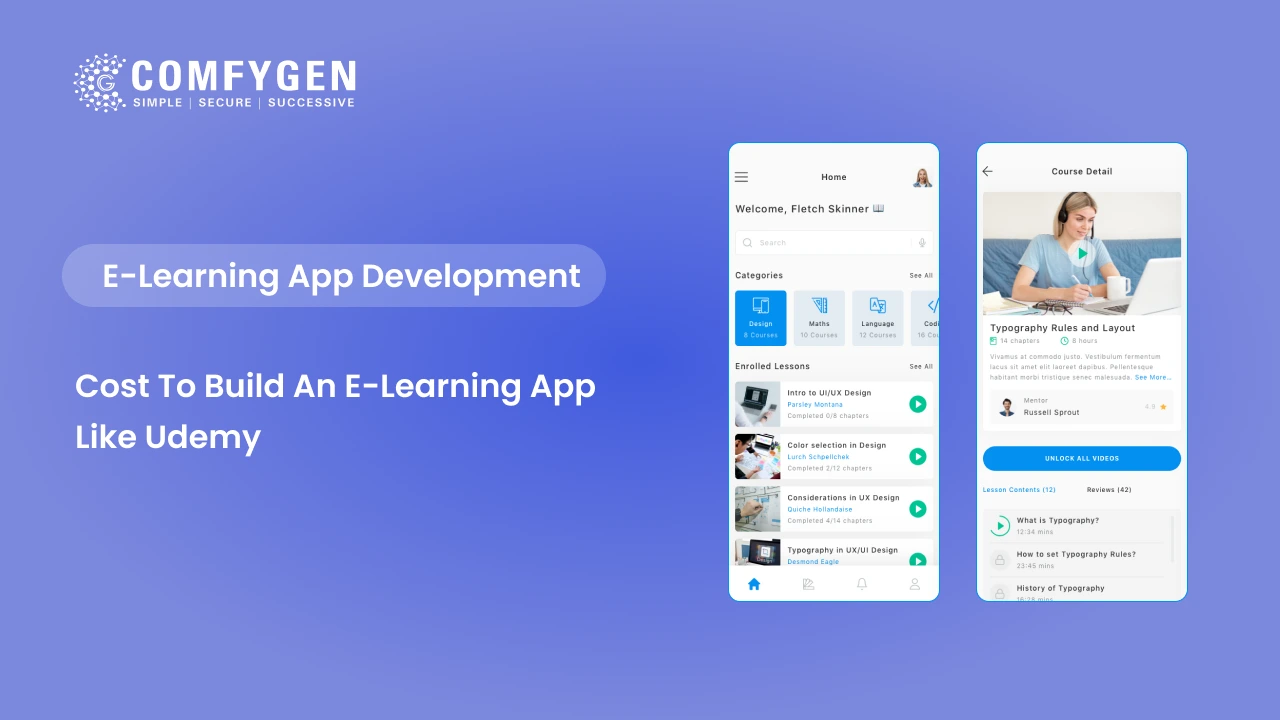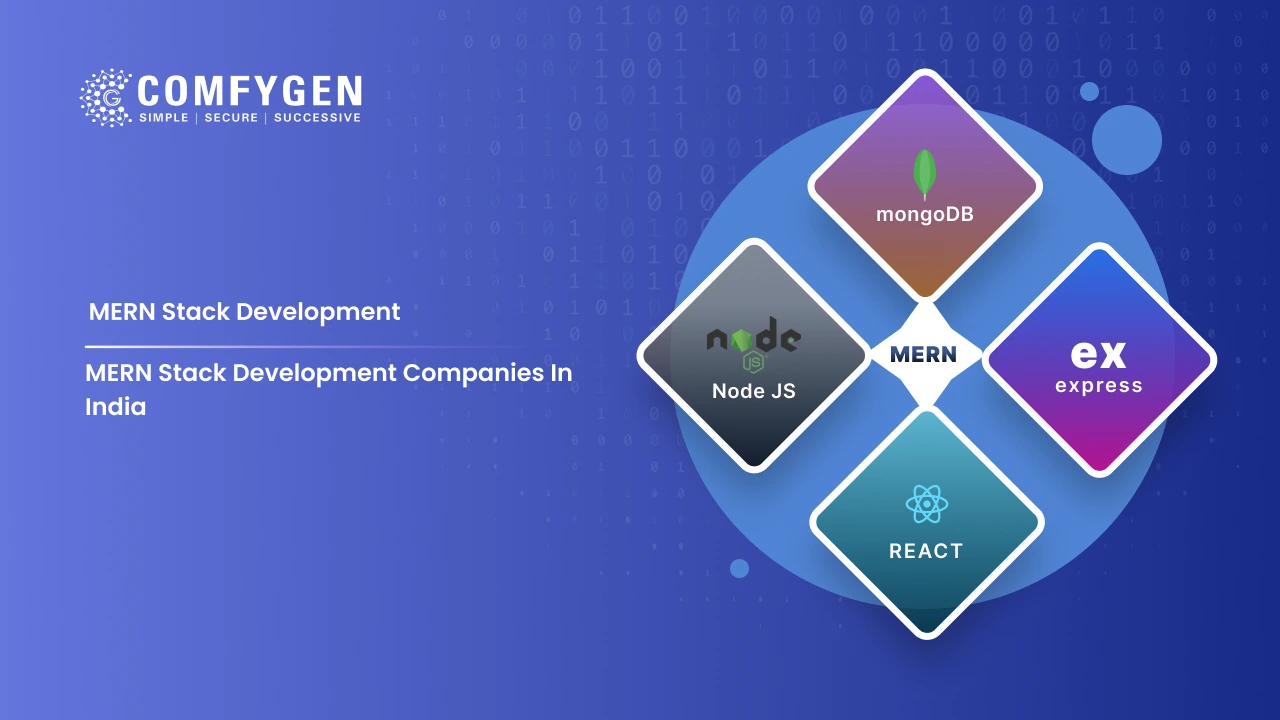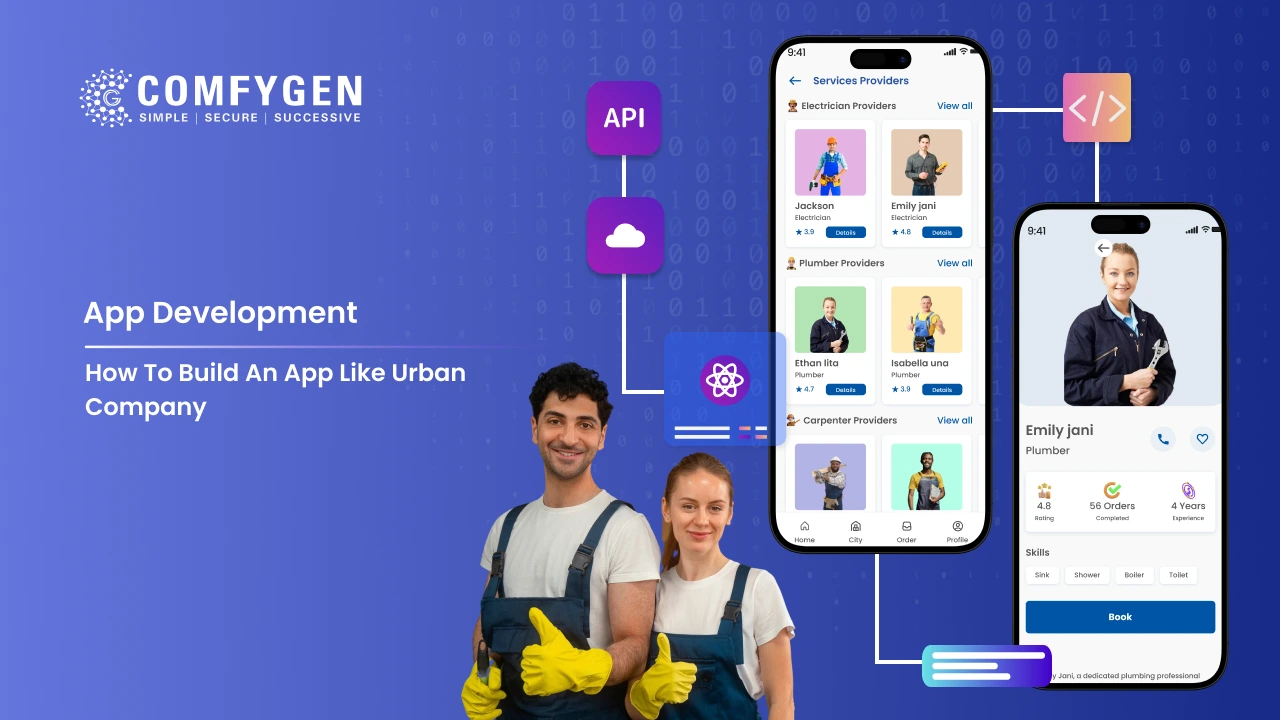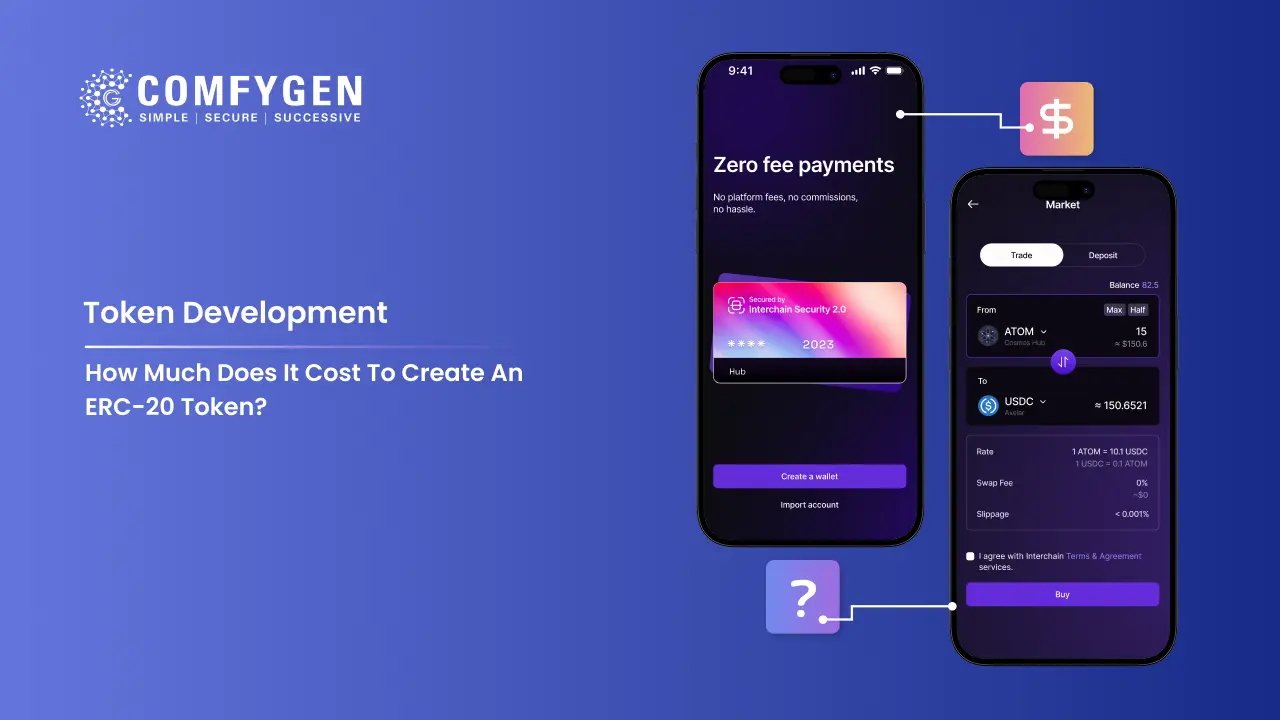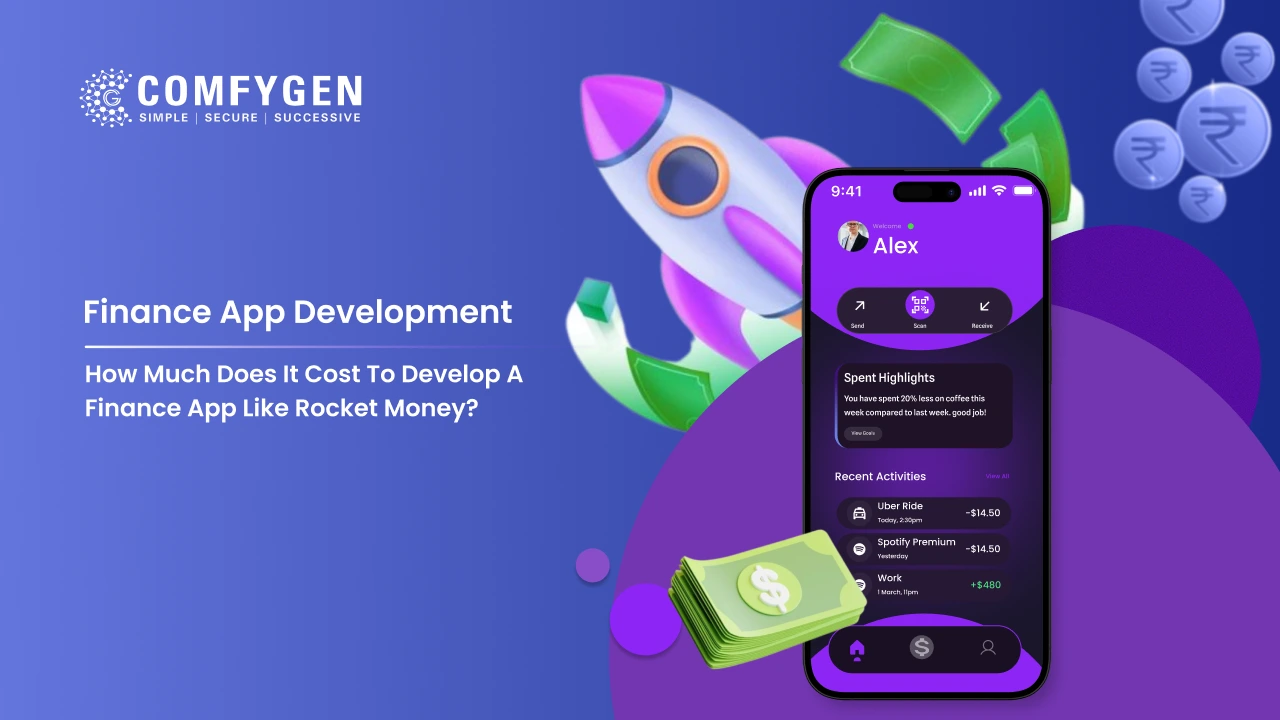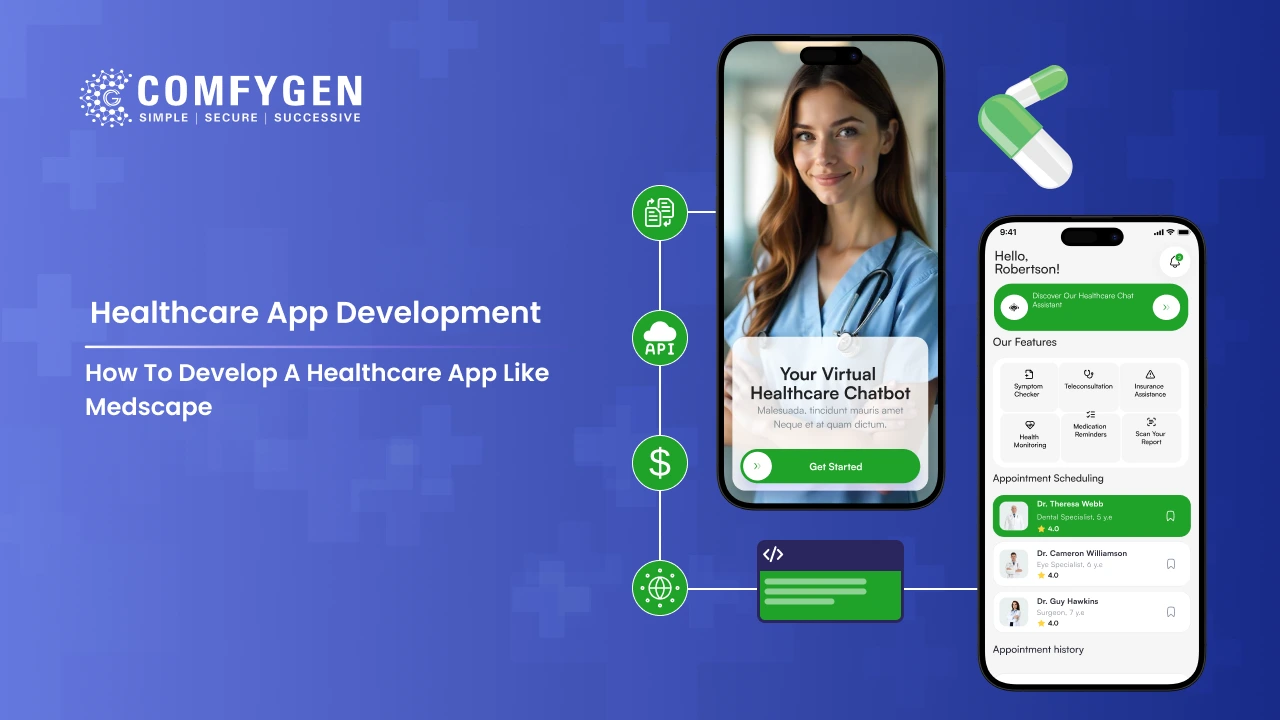Digital education systems are becoming very popular every passing day; this is why companies are investing in eLearning app development. Acknowledging the eLearning industry growth at a CAGR of 17.54%, EdTech companies are asking one common question: “What is the cost to build an app like Udemy or Coursera?”
An important aspect being ignored is; building an online education platform is not about uploading courses but creating an interactive and secure digital ecosystem for the learners, instructors, and administrators to coexist seamlessly.
Features like real-time video streaming, interactive assessment, or AI-based recommendation learning; every feature comes at an additional cost.
This blog will uncover many layers of EdTech platform development, such as the type of application, implementing features, tech stacks, and region-based pricing to give you a cost breakdown for e-learning app development that helps make informed and data-driven decisions.
Besides all these aspects, ensure you choose an experienced eLearning app development company to bring your vision to life efficiently.
What Does eLearning App Development Cost?
Building an app like Udemy means developing a multi-sided eLearning marketplace for Learners, Instructors, and Admin across mobile (iOS/Android) and web. That includes streaming, assessments, payouts, reviews, analytics, and more, which drives the cost directly.
Mobile-First eLearning app development costs between $30000-$120000. However, depending on the features, platforms, regions, and other factors Udemy-like edtech platform might cost between $50000-$100000. Clearly, it depends on the implementations and integrations in the application, which affect the development cost.
Understand Development Cost by Complexity
For a clearer understanding, we are dividing the complexities for the cost of Udemy app development estimation:
MVP: $25000 – $50000
This is the education model with main LMS features, where the learners can search courses, enroll, watch videos, solve quizzes, and basic progress. In this platform, the learners can upload courses and check simple sales dashboards. On the other hand, admins can do user/course management and run payouts.
Mid-Level Udemy Marketplace: $50000 – $100000
This education application will have better UI/UX designs and often be cross-platform friendly (iOS/Android/Web). The application ensures personalization, reviews, coupons, filters, and messaging/discussions for the learners. Whereas the professionals can conduct sales and engagement analytics with improved payout workflows. However, admins can do reporting, promotions, and commission rules.
Advanced EdTech Platform: $120000 – $300000
The Advanced EdTech mobile application is about integrating modern technologies into a future-ready platform. It includes multi-tenant, complex compliance, and deeper analytics.
Some Features are: AI-powered educational mobile app development for recommendations, adaptive learning, corporate training modules, Video CDN optimization, event streaming, live classes, and more.
(Note: To obtain a clearer picture of cost, consult with an eLearning app development company, which will give you an estimation about the cost to develop a robust e-learning mobile app like Udemy.)
Some Factors That Reflect Change in Development Cost
When estimating the cost to build an eLearning app like Udemy, there’s no fixed price list. The total cost of education app development depends on multiple technical and business factors, from design complexity to team location. Understanding these cost-driving factors helps you plan your budget more accurately and avoid overspending on non-essential features.
Design & User Experience (Approx. 10–15% of Total Cost)
| Design Scope | Estimated Cost Range | Key Inclusions |
| Basic Wireframes and Template UI | $2000 – $5000 | Single-theme layout, static components |
| Mid-level interactive design | $5,000 – $10,000 | Custom branding, responsive design |
| Advanced micro-interactions & animations | $10,000 – $15,000+ | Personalized dashboards, AI-based navigation |
Features & Functional Modules (Approx. 40–50% of Total Cost)
| Feature Tier | Typical Cost Range | What You Get |
| MVP (Core Features) | $20,000 – $40,000 | Registration, course browsing, video lessons, quizzes, reviews |
| Mid-Level (Enhanced Features) | $50,000 – $80,000 | Live classes, payment gateways, push notifications, reports |
| Advanced (AI & Analytics) | $90,000 – $150,000+ | AI recommendations, adaptive learning, gamification, live chat |
Technology Stack & Integrations (Approx. 15–20%)
| Technology Decision | Cost Implication |
| Native iOS & Android apps | Higher performance but higher cost (~25–30% more) |
| Cross-platform (Flutter/React Native) | Faster & cheaper for MVP builds |
| Cloud hosting (AWS, Azure, GCP) | $100 – $1,000/month depending on user load |
| Third-party integrations (payment, video streaming, chat) | $2,000 – $10,000 additional setup cost |
Backend Infrastructure & Architecture (Approx. 15–25%)
A secure backend is crucial for streaming, data storage, and analytics. The more scalable and data-heavy the app, the higher the investment.
- Cloud databases & servers (AWS, Firebase, MongoDB, PostgreSQL)
- CDN for global video delivery
- API integrations & load balancing
Development Team Location & Hourly Rates
| Region | Average Hourly Cost |
| USA / Canada | $80 – $150/hr |
| Western Europe | $60 – $120/hr |
| Eastern Europe | $40 – $80/hr |
| India / Southeast Asia | $25 – $50/hr |
Maintenance, Updates & Scalability (Approx. 10–20% Yearly)
Post-launch maintenance is a hidden but recurring cost. The Bug fixes, security patches, and feature upgrades can cost 15–20% of initial development annually.
Ready to Build Your Own
E-Learning App Like Udemy?
LET’S TALK
Using Udemy Clone Scripts vs Custom Build – A Fair Option
When startups explore the cost to build an eLearning app like Udemy, one question quickly arises: “Should we buy a ready-made Udemy clone PHP script or invest in a custom build?”
Both options can take you to market, but they differ dramatically in pricing, flexibility, scalability, and long-term ROI.
Udemy Clone Script — The Budget-Friendly Shortcut
- Cost Range: $5000 – $25000 (One-Time Investment)
- Development Time: 2 – 4 Weeks
- Ideal For: Early-stage founders testing market viability
A Udemy clone app script is a software package that replicates core Udemy functionality (course creation, payments, a student dashboard, etc.). It is often marketed as a quick launch option for startups that require speed and cost.
| Pros | Cons |
| Minimal upfront cost | Very limited custom options |
| Quick To Market | Generic UI/UX design |
| Some Essential Features Included | Security risks due to shared codebase |
| Faster setup process | Ownership limitations |
| Suitable for MVP launch | Hidden costs (add-ons, upgrades, maintenance) |
Custom eLearning App Development — The Scalable Investment
- Cost Range: $50000 – $150000
- Development Time: 3 to 6 Months
- Ideal For: Startups & enterprises building a scalable brand
A custom Udemy-like application means your development vendor builds the platform completely from scratch (its UI/UX, backend, APIs, databases, and cloud infrastructure). It will be more costly upfront; however, scalable and relatively unique for your brand in the long run.
| Pros | Cons |
| 100% Customization | Higher initial cost |
| Strong Architecture | Longer time to market |
| Data Security and Ownership | Requires technical Involvement |
Clone Script or Custom Build – Which One Makes More Financial Sense?
If you’re an early-stage founder, a clone script can quickly and inexpensively test your idea. But if your end goal is to build a sustainable eLearning business, the true ROI is customizing development. It gives you leverage, growth potential, and the ability to add other revenue streams such as subscriptions, certifications, or live mentoring.
How to Estimate Your Specific EdTech App Development Project Cost?
Every eLearning app idea is unique, which is why your educational application development cost will not match the estimate given above. The best way to estimate your budget tailored to the idea; understand cost differentiation from a technical and business perspective.
Product Scope and Vision
The first and most defining factor is your project scope. The scale of features, roles, and use cases you intend to cover. A basic MVP focuses on essential learning workflows, while a full-fledged marketplace may include AI recommendations, live classes, gamification, multilingual support, and analytics dashboards.
The broader your scope, the more development hours, integrations, and resources your project demands.
Technology Stack and Architecture
The tech stack you select — whether native, hybrid, or cross-platform — directly influences performance, scalability, and total engineering effort.
Elements like cloud services, database architecture, CDN integration for video delivery, and backend frameworks determine both efficiency and long-term maintenance costs.
UI/UX Design Complexity
A more well-designed experience with intent to leverage intuitive navigation, accessibility, compatibility, and adaptive interfaces takes more than just templates and pre-designed layouts.
EdTech mobile applications focused on interactivity and gamification while supporting visual learning will typically drive more design work than “standard” content.
Feature Set and Functional Depth
All features, including video streaming, course recommendations, etc. have their own layers of technical complexity.
Whereas, all modules, including students’ dashboard, instructors’ portal, admins’ controls, payment system, and analysis engine, contribute to the total effort required to develop a education app like Udemy.
So, more real-time interactions, tracking data, or automation lead to either a more complex backend or more difficult development of the platform.
Team Structure and Expertise
The type of development model (in-house, offshore, or hybrid) and the proficiency level of your engineering, designing, and project management resources are also factors in overall expense.
When teams have specialized expertise in EdTech ecosystems, learning management systems, and data analytics, they can produce higher-quality builds with fewer iterations, saving overall project costs.
Region and Collaboration Model
Budget planning is impacted by geographical location. The costs associated with development resources can vary globally, as can the efficiencies of collaboration. But if you work with an experienced offshore partner that practices agile communication, you essentially balance quality and budget well.
Maintenance, Scalability, and Future Enhancements
The launch is only the first step; however, the ongoing maintenance, scalability, and upgrading of the application will dictate the future allocation of costs.
Therefore, building a modular and API-based architecture minimizes future development work for enhancements and helps to better predict ongoing costs.
Compliance, Security, and Integrations
In the event of your platform dealing with personal data, assessments, or payments, compliance frameworks like GDPR, FERPA, or SOC 2 will be relevant to your project. Secure authentication, encryption, and third-party integrations (video hosting, LMS modules, CRMs) will also affect technical and financial planning.
How Comfygen Is Best Suited for eLearning App Development?
This blog is talking about build an elearning app like Udemy, which is a renowned edtech platform globally. Therefore, Udemy clone app development will need the expertise, skillset, and out-of-the-box professionals who can not only replicate but also add uniqueness to make your project stand out in the marketplace.
Comfygen Technologies is a dedicated niche-specific mobile app development company. We have highly professional and skilled EdTech Developers who can give you a new vision and value in the marketplace.
- Niche-Specific Mobile App Developers
- Cutting-Edge Technology & Compliance-Friendly
- End-To-End Modern Technologies Use
- Transparency & On-Time Delivery
- Future-Ready App Development at Rthe ight Cost
Key Takeaways
Building an eLearning app like Udemy is an investment that combines technology, creativity, and strategy. The overall eLearning app development cost depends on your platform’s complexity, features, and scalability needs.
Whether you opt for a Udemy clone or a custom education app development approach, success lies in aligning technology with learner engagement. Partnering with an experienced eLearning app development company like Comfygen Technologies make sure cost efficiency, innovation, and a product ready to compete globally.
Ready to estimate your Udemy clone app development cost and turn your idea into reality?
Let’s Build an eLearning App Like Udemy your next EdTech success story together.

Mr. Saddam Husen, (CTO)
Mr. Saddam Husen, CTO at Comfygen, is a renowned Blockchain expert and IT consultant with extensive experience in blockchain development, crypto wallets, DeFi, ICOs, and smart contracts. Passionate about digital transformation, he helps businesses harness blockchain technology’s potential, driving innovation and enhancing IT infrastructure for global success.

